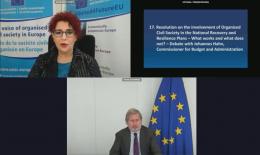European Economic
and Social Committee
"Member States are working hard, but there is still a lot to do before national plans are ready," says Valdis Dombrovskis at the EESC plenary
In a debate at the EESC plenary session on 25 March, the Executive Vice-President of the European Commission for an Economy that Works for People, Valdis Dombrovskis said that most of the national recovery and resilience plans (RRPs) are still at an early stage and that there is still a lot of work to do before the plans are mature enough
. He also stressed that trade policy has a key role to play in getting the EU economy back on track
The discussion with the Executive Vice-President focused on two main topics: COVID-19 recovery and international trade. Both EESC president Christa Schweng and Mr Dombrovskis agreed that trade policy has a key role to play in getting our economies back on track.
Proper and speedy recovery
The EESC president, Christa Schweng opened the debate by saying that the EU and its Member States have responded to the crisis in a timely and forceful way, and that the EESC is now counting on the speedy and efficient implementation of NextGenerationEU and the Recovery and Resilience Facility.
She also said that the EESC is calling for an economic governance framework that enables economic recovery, is prosperity-oriented and reflects the current post-crisis economic reality. The EESC is ready to discuss the economic governance review and has suggested launching a stakeholder conference to be co-hosted by the EESC and the Commission.
Regarding the national RRPs, Mr Dombrovskis explained that the Commission has received information from 23 of the 27 countries on what they intend to include. However, while speed is important to get the RRF funds flowing as soon as possible, what is important above all else is quality
. He warned that there is still a lot of work to do before the plans are mature enough to be submitted and approved. He flagged up three main areas which still require work: audit and checking systems; credible cost estimates and tracking of climate and digital spending; and respect for the principle of 'do no significant harm'.
The involvement of organised civil society
He added that the implementation of the plans must be flanked by support from the social partners and civil society at every stage. He thanked the EESC for carrying out a timely and relevant stocktaking exercise with its resolution on civil society's involvement in the Recovery and Resilience Plans. The resolution also points to several shortcomings on process and content, which we duly note
.
The Executive Vice-President is counting on the EESC contribution on the social dimension of the recovery. He praised the comprehensive opinion of December 2020 on the implementation of the European Pillar of Social Rights and is looking forward to the coming EESC resolution which will feed into the Porto Social Summit to be held by Portugal's Presidency of the EU in May 2021.
New strategy for trade
When talking about international trade, Ms Schweng said that a rules-based multilateral trading system, as well as an open, fair, inclusive and predictable international trading environment must continue to be a guiding principle for the European Union. She referred to the EESC's comprehensive contribution to the Trade policy review, comprising several opinions, as well as to the Review of EU Trade and Sustainable Development policy. She said that the EESC is looking forward to contributing to the analysis which would identify best practices in this field, with an own-initiative opinion to be adopted by September.
Lastly, Ms Schweng said that the EESC hopes the EU can inspire new cooperation and more consistency between the World Trade Organization (WTO) and other international organisations, such as the International Labour Organization (ILO), on matters of trade and investment, decent work, social and human rights, and climate change.
Mr Dombrovskis agreed that the right answer on how to support our recovery and ensure Europe's prosperity is to keep trading with our global partners. Regarding the institutional reform of the WTO, he said that the Commission's goal is to recast the WTO as a forum for tackling the most pressing problems of today’s world, such as dealing with the impact of COVID-19, supporting environmental and social sustainability, updating the rules for digital trade, and addressing unfair trading practices.
He concluded by saying that the Commission is ready to engage regularly with the EESC to discuss the latest developments in trade policy. Your monitoring role is very important
.
Work organisation
Downloads
-
"Member States are working hard, but there is still a lot to do before national plans are ready," says Valdis Dombrovskis at the EESC plenary

